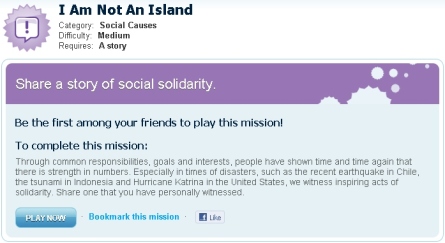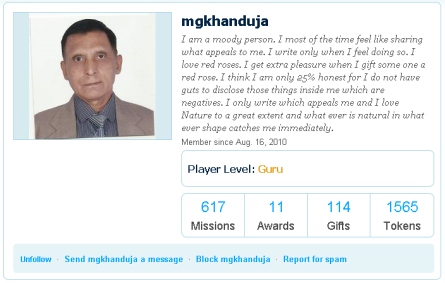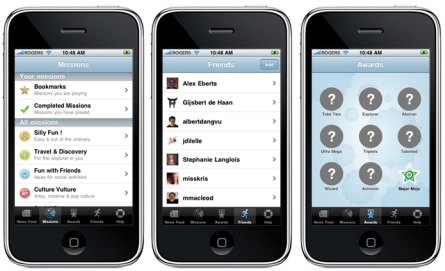How can we make everyday civic participation more compelling? There is a new kind of game on the horizon, one that experiments with real-world action. I call them “direct action games,” because they restructure acts like volunteering, activist training, and charitable giving. One early prototype is Akoha, which launched last year, quite off the radar of traditional civics activities.
At first glance, Akoha looks like a media hub for a do-it-yourself Boy Scouts. Their website and iPhone app reveal thousands of participants, many reporting on success with real-world “missions,” from going vegetarian for a day, to debating the “I Have a Dream” speech. The actual missions often take place offline, but are only acknowledged when documented with photos and stories for the online community.
Participants are mostly adults, but the ages vary widely. The experience is deeply social, as friends create missions for each other, and share their stories. More formal recognition for participation comes as players earn badge-like awards — such as “multi-talented” for those who complete one mission in every possible category.
Yet most of Akoha does not look or sound civic. Only one of the mission categories explicitly addresses “social causes.” The other nine concern self-actualization in various forms, from “health and well-being” to family time, engaging with popular culture, and the discovery of travel. Is this breadth an upside or downside? That depends on your civic goals, which might include:
- Fostering citizen journalism, as participants report on civic themes in their communities
- Informal civic learning, as participants reflect on their civic experiences in new ways through stories and pictures
- Building social capital, as participants create new ties across traditional social groups
These civic goals may be structurally possible with Akoha, but they are rhetorically hidden. Even as Akoha’s missions bring people into the real world, they avoid the “we are purely civic” framing that occurs on many activist and volunteering websites. For the Akoha community, it’s OK to admit that you are mainly there to have fun, or are trying to improve yourself (and not simply sacrificing for others). Consider this screenshot from the social cause mission “I Am Not an Island”:
Participation begins with the usual click of a button, yet the specific language of “Play Now” differs sharply from the tool focus of civic action websites (e.g., “Take Action Now;” or “Sign the Petition”). But what exactly does it mean to ‘play’ Akoha? Is it a game?
Certainly Akoha is recreational, and like all games, there are rules. In particular, participants must describe what they did to complete a mission, and thus must certify that they have met the terms set forth by the original mission author. Points and profiles track progress across the Akoha system. All players’ profiles feature their picture, personal statement, and a quantitative scoreboard — including their “player level,” number of missions completed, and awards. For a sense of what this looks like, here is one particularly high-achieving player, chosen from among the more than 10,000-plus who have registered:
This profile has evolved much as the community has coalesced. Just a few months prior, the player described himself in much more formal terms, emphasizing his offline profession — a “freelance Air conditioning and Refrigeration engineer by qualification and profession,” his belief in God, and how he found the site via Reader’s Digest. Now, in this recent screenshot, the player has removed his back story, and describes how his Akoha playing strategy is driven by his personality. His refined self-presentation aligns with the pragmatics of the Akoha community, which focuses on choosing missions and writing stories — both depending more on personality than professional accomplishments beyond the community.
Akoha is a designed system, and so earlier this year, I interviewed Alex Eberts, co-founder of Akoha and an influential force behind its design. He spoke of his desire to find “psychological drivers that are common to the real-world, and to game play.” His designs were informed by self-determination theory, which Eberts first came across in a session at the Game Developers Conference. (Academics, pay heed – these are not the usual dissemination channels for civic theory.)
Self-determination theory describes how human motivation is driven by basic human needs, including competence, autonomy, and relatedness. Altruism is not on the list of needs, just as it is not central to Akoha’s rhetoric. Pushing beyond traditional altruism in civic life is a theme that cuts across many of the projects studied by our research group — from the pop pleasure of Harry Potter, to the joy of diamonds as a precursor to political talk. Repositioning altruism is a battle, with fault lines between traditional civic organizations that have failed to engage youth, and new civic organizations that have failed to connect to politics. (See, for example, Bennett’s content analysis of youth civic websites.)
Connecting games with the real-world necessitates a basic immediacy. This immediacy also distinguishes Akoha from most civic games, which focus on education for future civic life or future civic action. Here, the action and education are both immediate. In other words, experiential education of the most authentic sort. The iPhone app for Akoha, released this past summer, underscores their immediacy -– here is a set of screen shots they provide:
Using the mobile interface, Akoha missions can be documented on a bus in real-time, or browsed from a neighborhood park. This is a fairly basic use of mobile, focused on interfacing with established Internet content, independent of geography. Yet Akoha’s mobile interface is only minimally aware of specific places.
Place matters, especially in civics. (The neighborhood of our birth strongly predetermines a host of life opportunities, from income to education and governance.) By improving Akoha’s mobile support for place, its implications for civic activity would be more immediate and profound. In particular, Akoha might offer support for filtering missions for one’s own neighborhood, or connecting with players who are geographically nearby for joint missions, or simply allowing missions to release new clues when players arrive at specific locations.
Games are still discussed as individual indulgences. Yet increasingly, games are recognized as social forces. This is especially true for Akoha, where the social construction of value emerges over time, as a participant’s “friends” share stories about their missions and accomplishments. Different communities are likely to form over time. It is not yet clear whether Akoha is dominated by preexisting networks of offline friends, or by more interest-driven networks of people who gather around a shared passion. This is a central debate around civic communities, and there is hope that Akoha may avoid the pull into left/right politics that Sunstein fears by providing a safe space for civic discussion.
Reimagining place is important civic work, just like the reimagining of societal values, tax policy, and even collective heroes. The value of games is to restructure this civic work around different rules – intrinsic motivations of the game, aligned with the desires of everyday people. Sometimes people want an excuse to be more civic. In my interview with Eberts, he confessed that one of the big surprises for his team was how much everyday people wanted support for being even more explicitly civic with the activities and missions of Akoha. He hinted that future Akoha versions would expand support for civic engagement.
Even as mobile has reshaped the everyday experiences of place and time, so too we may see game-like activities begin to restructure the experience of public participation. Yet Akoha remains an “edge phenomenon” to both the civic and gaming communities. In the first case, nonprofits are still trying to understand games for training, let alone for direct action; in the second, the independent gaming community is struggling to understand games for art, let alone games that improve the real world. Akoha is likely to be seen as a risky investment for funders in either community. Thus the evolving Akoha business model may be as crucial as its innovations in civic participation, and is worth watching. Eberts hints that corporate engagement may be one area to watch.
More broadly, Akoha raises questions about the definition and implications of direct action games. This was the subject of a panel I organized this year at Games for Change. Here is a video of the panel, featuring game designer Tracy Fullerton and activist/scholar Stephen Duncombe.
This blog post raises several questions about Akoha in the context of direct action games, including:
- Can games help us re-imagine civic activity under a different set of rules?
- If only a portion of the activity is civic, how do we appropriately value our investment in the overall activity?
- Where is the psychology of civic participation aligned with that of playing games?
- When is it appropriate to teach citizens how to “game the system” of democracy, and of our communities?





hi Ben, thanks for the interesting post about this innovative company!
I’m curious about the transition from the beta incarnation of Akoha to its current form, how and why the thinking behind Akoha’s emphases (in terms of business model, social practice, technology platform etc.) evolved, and what this might say about new media civics in this context.
Based on my admittedly brief review of Akoha’s current and beta forms (mostly focussed on a comparison of the current “Akoha Experience” picture on the Akoha website’s About Us page ( http://akoha.com/about-us/ ) with this older comic explaining how the beta version of Akoha worked http://www.crunchbase.com/assets/images/original/0003/2928/32928v1.png (click image to zoom in)), the most striking shift I noticed was that the beta vision of Akoha seems to be far more socially focussed than the current version. The beta comic describes a process which entirely revolves around face to face meetings between people (with an exchange of physical cards as “proof”), driven by an underlying philosophy of “come play it forward” (the slogan of beta Akoha) – that is, of explicit pro-social passing-on-a-good-turn practice (based on the old idea of “pay it forward” http://en.wikipedia.org/wiki/Pay_it_forward ). In contrast, the “Akoha experience” depicted in the current website’s “About Us” page is communicated through a variety of mission examples but none of which are based on social interaction (moreover, the beta’s prioritization of face to face meetings confirmed by physical card exchanges has been dispensed with entirely in favor of online communication/recordkeeping). Instead, all the examples are solitary (except for recording them on Akoha’s online network) activities and there seems to be a shift in the rhetoric from the pro-social to one of *self*-fulfillment and *self*-growth.
Instead of “Come Play It Forward”, Akoha’s slogan is now “Try something new. Discover and share everyday moments
of real-world fulfillment.” The logic seems to be now more about using the affirmation gained from the online social community to motivate your own self-growth pursuits, rather than the passing-on-a-good-turn-and-reaffirming-social-ties-through-offline-face-to-face-encounters in the beta version. I suspect that the actuality of practice amongst the community member is more complicated than either the current or beta vision implies, and I think the differences between the two visions, and the actual practices that they presided over will be worth investigating as an example of the pressures faced by evolving new media civics projects.
It is very interesting for me to read this blog. Thanx for it. I like such topics and anything that is connected to this matter. I would like to read a bit more on that blog soon.
Kate Meetington
female escorts london